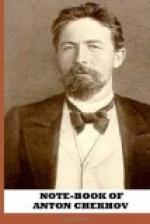December 4. For the performance [of the “Seagull”] on the 17th October see “Theatral,” No. 95, page 75. It is true that I fled from the theatre, but only when the play was over. In L.’s dressing-room during two or three acts. During the intervals there came to her officials of the State Theatres in uniform, wearing their orders, P.—with a Star; a handsome young official of the Department of the State Police also came to her. If a man takes up work which is alien to him, art for instance, then, since it is impossible for him to become an artist, he becomes an official. What a lot of people thus play the parasite round science, the theatre, the painting,—by putting on a uniform! Likewise the man to whom life is alien, who is incapable of living, nothing else remains for him, but to become an official. The fat actresses, who were in the dressing-room, made themselves pleasant to the officials—respectfully and flatteringly. (L. expressed her delight that P., so young, had already got the Star.) They were old, respectable house-keepers, serf-women, whom the masters honored with their presence.
December 21. Levitan suffers from dilation of the aorta. He carries clay on his chest. He has superb studies for pictures, and a passionate thirst for life.
December 31. P.I. Seryogin, the landscape painter, came.
1897.
From January 10 to February 3 busy with the census. I am enumerator of the 16th district, and have to instruct the other (fifteen) enumerators of our Bavykin Section. They all work superbly, except the priest of the Starospassky parish and the Government official, appointed to the Zemstvo, G., (who is in charge of the census district); he is away nearly all the time in Serpukhovo, spends every evening at the Club and keeps on wiring that he is not well. All the rest of the Government officials of our district are also said to do nothing.
With such critics as we have, authors like N.S.
Lyeskov and S.V.
Maximov cannot be a success.
Between “there is a God” and “there is no God” lies a whole vast tract, which the really wise man crosses with great effort. A Russian knows one or other of these two extremes, and the middle tract between them does not interest him; and therefore he usually knows nothing, or very little.
The ease with which Jews change their religion is justified by many on the ground of indifference. But this is not a justification. One has to respect even one’s indifference, and not change it for anything, since indifference in a decent man is also a religion.
February 13. Dinner at Mme. Morosov’s. Tchouprov, Sololevsky, Blaramberg, Sablin and myself were present.
February 15. Pancakes at Soldatienkov’s [a Moscow publisher]. Only Golziev [editor of Russian Thought] and myself were present. Many fine pictures, nearly all badly hung. After the pancakes we drove to Levitan, from whom Soldatienkov bought a picture and two studies for 1,100 roubles. Met Polyenov [famous painter]. In the evening I was at professor Ostroumov’s; he says that Levitan “can’t help dying.” O. himself is ill and obviously frightened.




